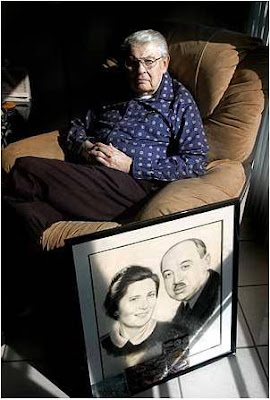

Posted on Thu, Jan. 27, 2005
TALES OF SURVIVAL
60 years after Auschwitz
BY SARA OLKON
solkon@herald.com
When the Red Army arrived to free prisoners at the Nazis' Auschwitz concentration camp in Poland 60 years ago today, the liberation held little meaning, at first, to those who had somehow survived.
Jan. 27, 1945, was simply another day in hell for people who had been isolated, forced on death marches or enslaved at munitions plants.
Liberation gave way to a new set of horrors: survivor's guilt. The knowledge that loved ones were dead or the uncertainty of not knowing. There was crippling illness. Often, they found, strangers had stolen their homes.
The Herald talked to some South Floridians who were prisoners at one time in Auschwitz, as well as a soldier who helped liberate a Nazi work camp, about the anniversary.
• Arno Erban
• Morris Rosenblat
• Kathy Berger
• Halina Laster
• Warren Melgaard and Leo Rosner
South Florida Commemorations
The Simon Wiesenthal Center will hold two candle-lighting programs. The commemorations are free, but reservations are suggested. Each program will be followed by a screening of the film Unlikely Heroes, which documents lesser-known stories of men and women who resisted the Nazis during World War II.
• Today: 7:15 p.m., Temple Beth Sholom, 4144 Chase Ave., Miami Beach. Call 305-538-7231.
• Feb. 2: 7:15 p.m., Temple Beth El, 333 SW Fourth Ave., Boca Raton. Call 561-391-8900.
Posted on Thu, Jan. 27, 2005
ARNO ERBAN
Arno Erban remembers concrete rows and the clunk of heavy boots at Auschwitz.
He remembers 3 a.m. head counts and rubber clubs, icy barracks where he slept across other angry bodies, as feet kicked at his shrunken face and torso. He remembers the smell of burning flesh and hair.
Erban was sent from Auschwitz to Jaworzno to Terezin. His liberation, falling about the same time Auschwitz was freed, is a jumbled blur. There had been gunfire outside for three days and two nights.
It was sunrise when Erban and some 30 other prisoners saw tanks coming in over the horizon. They sat together in their filthy and frailed prison garb and waited. At the time, the six-foot-tall Czech-native weighed 75 pounds.
''We didn't know who it was,'' said Erban, now 82. ``Then we heard some noise, words. We knew it wasn't in German.''
Russian soldiers handed out small bags of sugar and tins of lard and brought the prisoners to a nearby hospital. The first question at the door: Are you Jewish?
Hospital staff wanted to keep the Jews and non-Jews separate, Erban said from his home in Miami Beach.
Gun battles broke out again outside the rural hospital. Doctors, nurses and most of the Poles fled. Erban and the others went to nearby farms and begged for food.
``I was liberated several times. I died several times.''



No comments:
Post a Comment